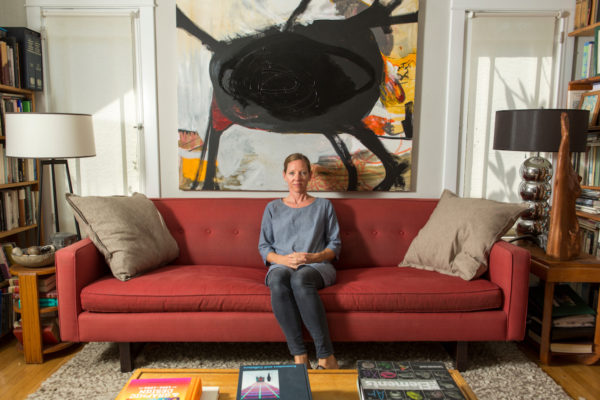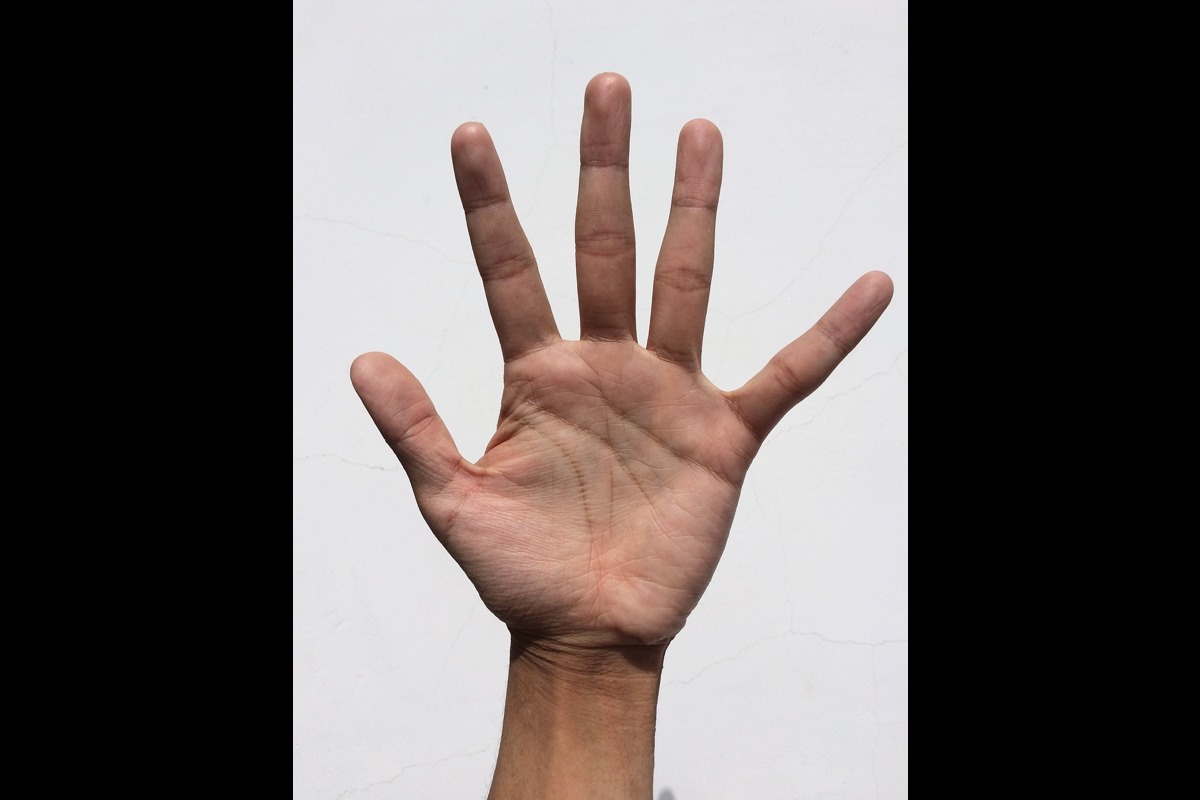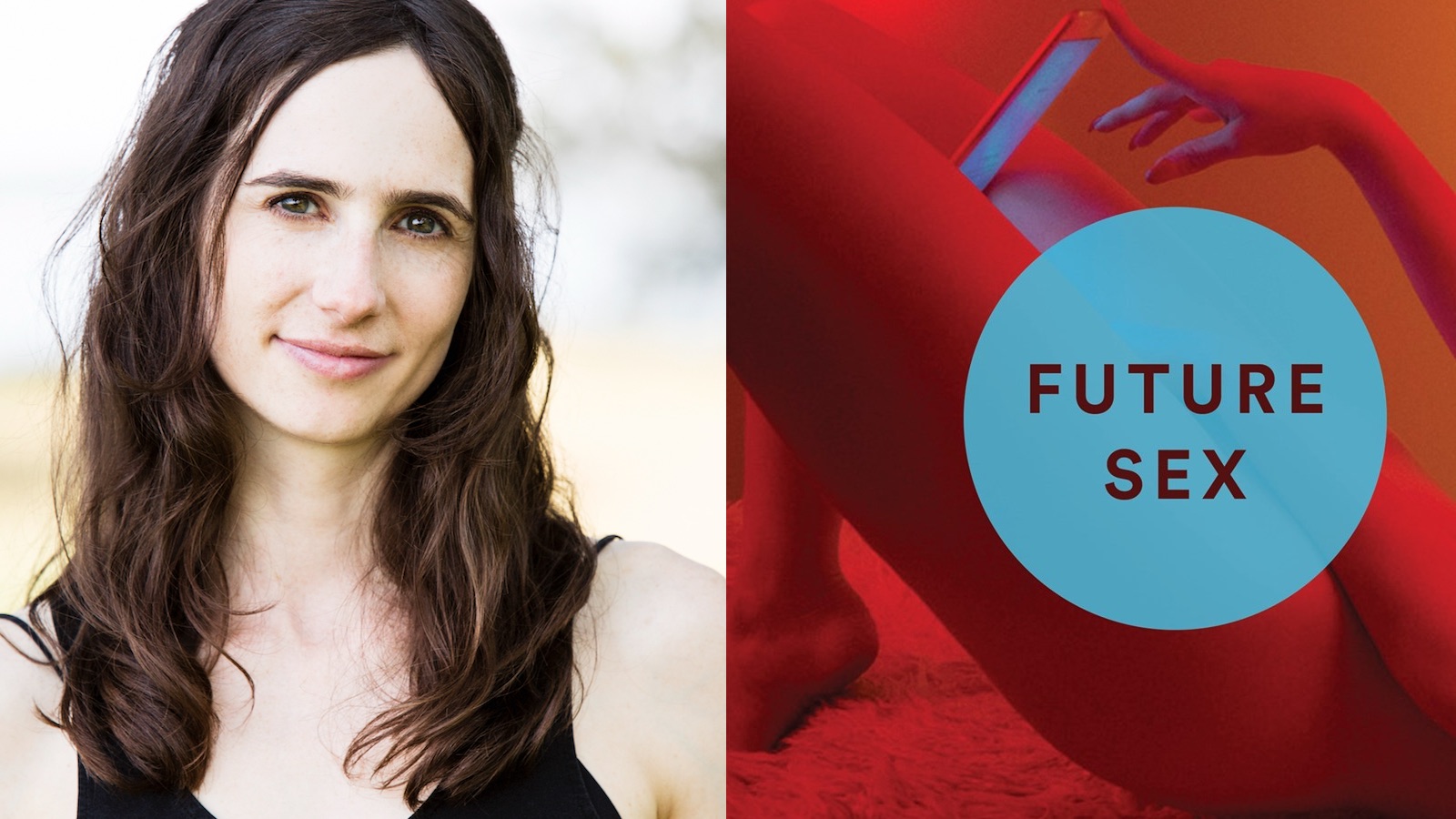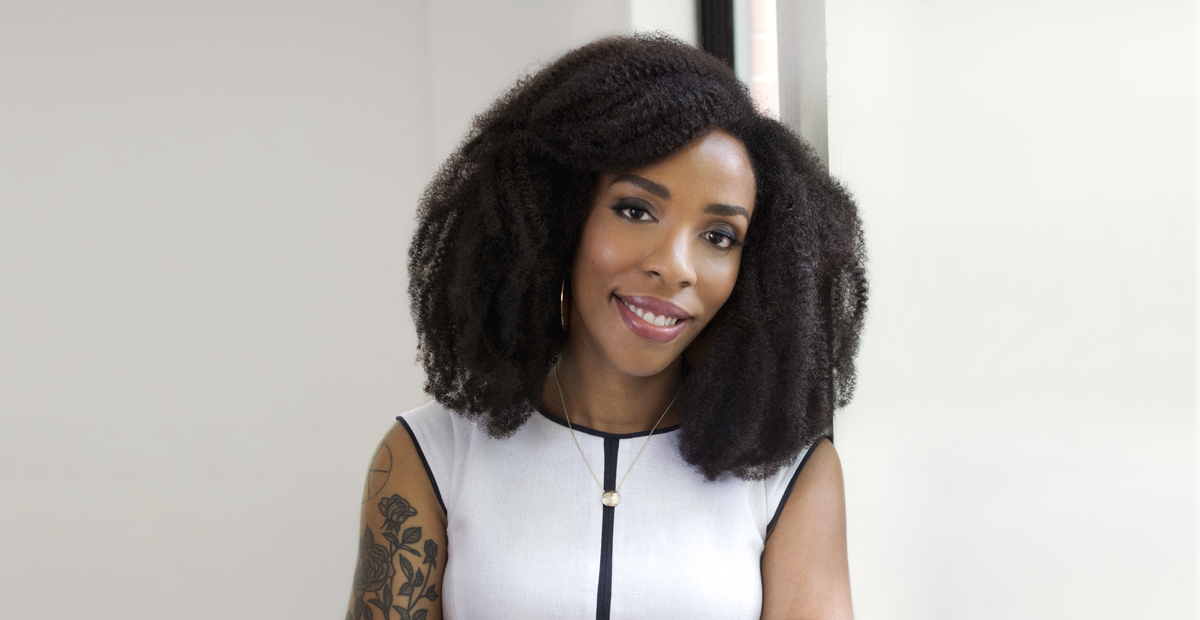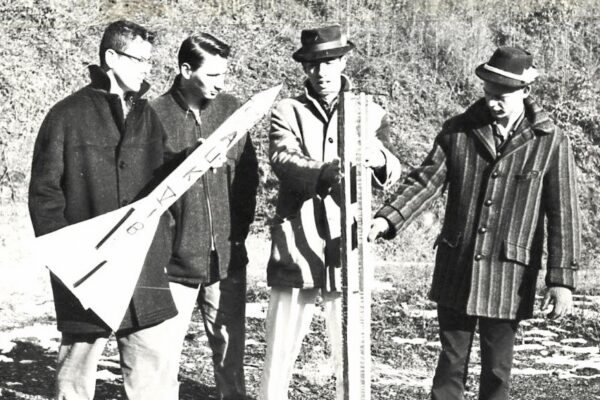Passion and philosophy are the twin rivers that run through Maggie Nelson’s body of work, most notably in her latest book, The Argonauts—though perhaps she wouldn’t see these pursuits as totally different enterprises. As a writer, her books resist categorization; they blend art criticism, queer and feminist theory, and autobiographical experience. The intellectual, emotional and physical are in conversation. As a person, she seems equally suspicious of any fixed identity that might be pinned to her lapel.
When I met Maggie before her Creative Writing Lecture at Columbia University she was all dressed in black, with bell sleeves, and as I asked her to sign my books with my blue pen, I was reminded of the time I had some books signed by Patti Smith. What is it about Maggie Nelson that reminded me of Patti? Perhaps it was a sense of someone who was comfortable in their own skin; confident, but at ease: they trust they can shimmy out of any box you try to put them in. This is something I still associate with rock stars—writers, in the business of articulation, rarely embrace that kind of fluidity.
I first encountered Maggie Nelson’s work through Bluets (2009). Like all of my favourite books, Bluets came into my life when I needed it most—a time when I was wondering if love, or even passion, could exist in the same moment as grief. A book about pain, unrequited love (with a color, with a person) and beauty—it read to me like a series of meditations for anyone who has ever felt the bright burning blue of loneliness. It’s still the book I turn to whenever I feel any shade of blue. Reading it gives me the same feeling as when I look out at the ocean—which I give as the highest compliment, because to me the ocean is the greatest artwork in the world.
To talk with Maggie Nelson is to stand together on the shifting sands of identity and genre. She is the author of four poetry collections and five books of non-fiction including, most recently, The Argonauts, which won the National Book Critics Circle Award in 2016. She is the recipient of a 2016 MacArthur Fellowship, a 2012 Creative Capital Literature Fellowship, a 2010 Guggenheim Fellowship in Nonfiction, an NEA Fellowship in Poetry, and an Andy Warhol Foundation/Creative Capital Arts Writers Grant.
Madelaine Lucas: In your work, the personal is political, physical and philosophical all at the same time. Is it difficult to switch gears when you’re writing a book?
Maggie Nelson: No. I think writers typically write what’s natural to them. So, what to other people seem like gulfs or divisions are not to me. I’m not leaping over anything to link things. Some people say, “Would a Judith Butler passage really occur to you, as you’re, you know, having a cracker?” and I’m like, it sure does to me! I think for most people who read a lot or live a life of the mind that’s what your life is like, so it’s not a performance per se.
ML: Do you feel like one of those modes comes more naturally to you when you’re writing? Is it easier to write the personal, or the philosophical?
MN: It just depends. Different subjects require different modalities. The difficulty is always about articulating your sentences in ideas. It’s not about those modes.
ML: Do you have any writing routines or work rituals that you stick to?
MN: Zero.
ML: None? What does a day at work look like for you?
MN: I don’t know. I feel like an amnesiac, I don’t even know when I work, it’s like a blackout or something. I see that I have books and that I wrote them at some point in time, but I’m either writing a book or I’m not, and if I’m writing it I’m thinking about it and working any moment that I have free, and printing out pages and line-editing them and re-entering my line edits, and going at it again. But you know, my life is circumscribed by work and family in such a way that it’s very clear that my writing hours are exactly when I have no other obligations.
ML: A lot of the writing that feels really exciting to me at this moment is by writers like yourself who work in a couple of different genres, or between genres. I’m thinking of other critics who are also poets, like Ben Lerner and Eileen Myles. Do you feel like there’s a relationship between those two forms?
MN: Not if the individual writer doesn’t feel the need to do both. I don’t think there’s an intrinsic relationship that exists outside a particular writer… I tend to know more people who work in the realm of poetry, criticism, and non-fiction, or autobiography. The gulf would be with fiction writers, some of who I think are excellent critics, but I think that there’s a scribing practice, an observational practice, of the daily mixed with abstract contemplation that can characterize all nonfiction and poetry in particular. All those things play into fiction as well but I think that novelists seem like a very specific breed who have a very particular talent for being able to, almost against their will, imagine their ideas in characters and scenes and speculative language, which I think is a different enterprise.
ML: Do you feel like the form of the essay or the form of a poem is more open to play or experimentation?
MN: I think that everything is as exactly open to experimentation as you want it to be. I think that people also change over the course of a life—like both Ben and Eileen, for example. I think first people might do some auto-fiction and get a taste for what the fictive is; you know, trying it on for size. And then they might challenge themselves with something that’s more untethered from so-called reality. I think people try out different enterprises.
ML: Sure. Do you work in non-fiction and poetry at the same time?
MN: Not right now. I haven’t written poems for a long time.
ML: It’s not, like, a secret thing you’re doing on the side to give your brain a rest from criticism?
MN: No, I mean, it’s very odd. I was a poet for so long and if you’d interviewed me fifteen years ago I would have said poetry was how I was put on the planet to experience the world. But, I think that writers change… It’s not where my interest is at in the present time.
ML: I was thinking about your book Jane: A Murder and how you revisited the subject of your aunt’s murder again in The Red Parts. I’m wondering what that experience was like, looking at the same story from two different angles and in two different forms.
MN: They were the same ostensible topic, but I think that, in neither of those books is their truest subject my aunt’s murder.
ML: Of course.
MN: I think each one had to find what its true subject was and to me the true subject of each of those books was wildly different. The second one has much more to do with the loss of my father and certain questions about breakdown, and the first one is much more about twinning and sistering and inter-generational haunting and a different set of questions.
ML: When the case was reopened and you decided you were going to cover the trial, was it clear from the beginning of the project that this book was going to take a different form from Jane?
MN: Definitely. I think in Jane the poems started to get quite flat as they became burdened with information, and the trial was all information. I mean, Jane is kind of using the lyric—and the good thing about that, the reason I think the lyrical worked for that book is that I only had shards of information. But when I had overflow of information—and information that I also needed to give for the book to make sense, like, this really convoluted story about these DNA matches with this four year-old’s blood. Unless I was going to write in terza rima for three hundred pages, it way exceeded the kind of information bearing that I thought a poem could have and still have a fidelity to the poem qua poem.
ML: That makes a lot of sense. So I listened to an interview that you did at The London Review Bookshop after The Argonauts came out, and you mentioned that there was an early piece of criticism or a review that mentioned, “The Argonauts brings a critic back to her body”—
MN: Oh, yeah.
ML: Which I loved, because as you rightly said, so much in your books is about the physical experience and the carnal. When I first came to Columbia University, my first workshop professor gave us the advice, “Remember you have a body”. And she was talking about creating a routine—
MN: In your lived life?
ML: Yeah, and basically was like, we want to be writing machines, but we have bodies, and you have to make a schedule that allows you to sleep and eat and pee and do whatever you have to do. I wanted to ask you about that because sometimes writing feels like a process that is very distant from the body, so I’m wondering how you keep in touch with your body, how you access that physical experience while you write?
MN: I actually think that as you grow older that writing’s relationship to being sedentary is one of its harder features to manage. I feel like when I was younger—you know how it is when you’re in your twenties, you’re like, “What body?”—you’re hung over, hurling yourself into piles of trash—at least, I was. You don’t have the same mortal concerns but you also just don’t suffer quite as much (the effects of your decisions, that is). I pace a lot; I get up a lot. It’s hard in this distracted age. I mean, I used to pace a lot more to get up and look for a book, but now you can look for virtually anything on the same device that you’re sitting at—you can keep distracting yourself on the same device. But I also try and old-school distract myself by getting up.
ML: I guess that’s the practical side, but from a craft point of view, I feel like you write about physical experience so well, it’s so visceral and really comes alive on the page. And it seems, at least in its published form, to come so naturally to you, and as a writer it’s something you’re interested in, but I’m wondering for people who do feel a disconnect from their writing body and their actual physical experience, do you have techniques or methods for trying to access that part of your experience?
MN: I don’t know… I can see the advice for people, like they always tell journalists to use your five senses when you’re in places, and I see that there are genres where there are good rules for always involving your physical body. But I don’t think writing is better when it’s more bodily—or I don’t even know that more bodily means more about the body. Some writing that has nothing topically to do with the body can be felt by a reader as very visceral ideas, as Keats said, can be felt on the pulses. I wouldn’t think that anybody had any imperative to connect with their body. I was a dancer for many years of my youth—
ML: I didn’t know that—
MN: I love being in the studio, I love ballet, yoga, and I’m a swimmer. I’ve always been an active person. I wouldn’t say that at this point in my life I’m a nervous person but I certainly run quickly, so the sedentary activity of writing chafes against my natural desire for movement. It’s more natural for me to write about the body than it is for me to sit there and do it. (Laughs)
ML: How long did you do ballet for? Was it ever a professional thing?
MN: No I wasn’t like a ballet ballet dancer. I studied a lot of dance in college, and when I hit New York, I hung out in the downtown, post-modern Judson Church Movement Research Danspace world for a time.
ML: Do you think that experience influences your writing at all?
MN: For a long time, it did, very much. It still does a lot because I did a lot of improv and you don’t worry so much about… Well. Two things: improvisation, and improvisatory dance, were useful to me because what they encourage is, instead of letting it all hang out, what people often called it was composing on the spot. You had to look at dance spaces and look at the room and look at the bodies in the room and look at things that were going on and try and imagine how you would be composing the dance in the moment. Writing is very much the same thing when you’re gesturing into it. I mean, later on you have what you don’t have in dance, which is all this time to go through drafts and re-edit and things like that. But I think I don’t worry so much about my books—and I think this is a poetry thing too—but I see them as the best I could do, or gestures at any given moment.
ML: I love that idea. That really resonates with me a lot because in my former life I was a musician and I still play now, and sometimes I get a bit frustrated with writing because when you play live music, like dance, there is that spontaneous quality. When you connect with your audience they’re right in front of you, and to me there’s a little bit of a barrier in getting that effect of immediacy and intimacy in writing.
MN: As Eileen Myles put it to me, in writing, you have to use artifice to strip artifice of artifice. You get to that immediacy, oddly, through a lot of worrying over sentences and stuff. I mean, not if you’re like Jack Keroauc, writing On The Road on speed on a telex. That’s one thing—and there’s a lot of poetry I like in that tradition. But to me the trick is, if you know how much you’ve cooked something, and people keep referring to your work as raw, that’s really fascinating, because it means that you somehow wielded this artifice to make something feel very raw that you happen to know is not, and often felt was like the death of all spontaneity as you were writing it.
ML: Definitely.
MN: Like what you’re saying about being a musician, it’s almost like you have to be your own audience while you’re writing and kind of edit it and make it sound different. And then you read it and you’re like, surprise me, self! (Laughs).
I like that more than, in some ways, reading aloud. There are some people, especially a lot of poets, who are just so good at feeling the vibe of the room and they treat writing, especially the poetry itself, as a kind of performative space—and I don’t say this in a self-deprecating way, it just feels true—but I don’t feel like a talent of mine is moving energy around a room.
ML: But you did it in dance.
MN: I did, but I wasn’t a great dancer (laughs). Well, I was an adequate dancer, I was a decent dancer, but I quit it because I knew that the pleasure my body got out of dance was greater than its indispensability to a dancing company. I got a lot of pleasure out of it, but you can get the same pleasure from being in a class.
ML: I’m interested in what you said before about trying to surprise yourself when you’re writing and I’m wondering if you have a sense of when you should stop editing or when it’s killing an idea rather than letting it breathe. Does that happen to you? And if it does, how do you go back, how do you breathe life into it again?
MN: Well, you know you save your drafts. My partner’s a sculptor and he’ll cut an arm off something and after he’s cut it off he’ll just be like, “oh shit, that was the wrong move” (laughs). And then it’s off and you can weld it back on, but I always feel like, phew! I have all those drafts saved. Often I feel like the answer to the question you have is that sometimes it’s in writing you still have to do, and sometimes it’ll be in writing you’ve left behind, so you have to go look around.
ML: I find that challenging though because in art, you can see that the arm got cut off that shouldn’t have got cut off, but on the page it all looks the same. I feel like it’s difficult to track the trace of the idea and when it gets lost.
MN: It’s funny, I’m moving right now in LA and I have all these boxes of drafts—from especially before computers when I used to work on typewriters—and I just keep thinking, you know, you have this aggrandized feeling that like you’re supposed to always carry around all this garbage in case someone will care. You know, T.S. Eliot and Pound, editing the fuck out of The Wasteland or whatever. And I’m kind of like, I couldn’t care less. Personally, the book is like—that was the best and I don’t want anything else that led up to it (laughs). It’s as good as it is.
ML: One thing I loved about both Bluets and The Argonauts is the fragmented structure—I don’t know if you consider it to be fragmented—but the way it’s all arranged… I wonder if those white spaces in between, if they’re a way for those drafts, those lost words to breathe, or to give space to everything that’s not said. I mean, you talk about this in The Argonauts, this idea of language being a net with holes.
MN: Yeah, I mean, the only compositional structure of The Argonauts is one space or two between paragraphs. Bluets, with the numbers, to me is a little different because those are very heavily performed spaces. But yeah, I think that I enjoy thinking in chunks that you can then move around.
ML: I feel that, theme-wise, it was more important for The Argonauts to be less structured in that numerical way, to have the idea that the fragments could be more free-floating. But I wondered about the challenge of figuring out how to organize them, because one thing I love about your work is the transitions. They feel organic, but not totally digressive and not totally obvious either. How do you get a sense for the way things should be arranged on the page?
MN: Trial and error, y’know (laughs). I mean it’s super fun. It’s fun to re-arrange. I love arranging. The poet in me is just like, let’s arrange stanzas for the rest of our lives! But it’s hard. It requires, I think, kind of deep intuitive content labor, which usually bespeaks the problem of the book itself. So, like, if the problem of The Argonauts is can you have all this discourse about maternity or infancy in this space of this conversation about queerness or whatever—that’s kind of the book’s question… You know, bad reviews of my work on Amazon are always going to be like, “This is a bunch of disconnected ramblings that have no relationship to each other whatsoever!” But that’s the edge that you’re working with while you’re doing it. You know intuitively, I think this anecdote belongs in here, but I don’t quite know why yet. And then whether it does or doesn’t is usually related to what the book is essentially about. So you have to learn what your subject is and then learn what parts belong and then learn what order they need to go in.
ML: Do you ever read them out loud one after the other to see if the transition is working?
MN: No, that would take too long. But often I print them out. If it’s like an anecdote or something I’ll print it out and see it’s three pages, and another one’s two pages, and I’ll lay them out and move them around… But you know, I came up as a poet and both of those books are also structured by lines that repeat. So then you’re also working this other logic that’s not narrative. Ben Lerner does this too and I feel like with poetry, our only trick—because we don’t do narrative—is like, I introduced this line to you earlier—this concept—and now I’ll introduce it to you again twenty pages later. I always call it “sound stitching” in my head. You’re stitching the sound of a phrase, but each time it recurs it means differently because of what came in between it. It’s a means of holding things together if there’s no temporal narrative.
ML: Absolutely. That’s how it reads, like refrains.
ML: It feels important to ask right now in this post-election haze that we’re living in, a lot of people have been asking about whether art matters—does art matter—and I wondered what your take on that was?
MN: Just a small question! (laughs!) I’m kind of like a stickler, so it’s a little broad to answer because I don’t really know, like— what does “matter” mean? Of course art matters. Is it the agent for alleviating people’s suffering in the most direct way? No. But is that what “mattering” means? I don’t know. All forces around us are agitating for a world in which art is impossible and doesn’t exist—we don’t have the headspace or anything to enact it. So it seems to me very important to stake that claim on doing it. I mean, I wouldn’t put my money on it for social movements, but that’s not what I look to art to do per se, so I don’t know. What do you think?
ML: I always feel deep down that art matters. It’s something so deeply rooted in me that I don’t know how to justify it. But living here as a non-U.S.-citizen, there’s a sense of helplessness and it can seem like, if these conversations are going on and you’re not responding to them, is your voice important right now?
MN: Sure. I mean, I think people have to figure it out for themselves. If your conscience is telling you it’s not the best use of your time in any given era or moment, then go do something else. George Oppen stopped making poetry for thirty years to do political labor and that seems to me a totally fine thing to do. I get asked to write op-eds and it’s been a little difficult trying to figure out—actually not that difficult—it’s been very easy for me to figure out I don’t do that because I don’t have a bone for it. I’m not interested in it as a modality of writing. Of course I want what I do to matter, but is it okay to turn away from that sphere? There’s almost nothing I could say in that op-ed that somebody else isn’t already saying, so I try to do work that I don’t see appearing, think about thoughts that might take longer and that somebody else might not be having. I don’t see how you can do that with, you know, 24-hour deadlines. It’s not a world that I’m comfortable in.
ML: I know you don’t do social media and to me that ties in to this as well. My personal feeling is that books like yours are contributing to the conversation in a deeper way. They do take longer, but there’s more space to hold many different conflicting feelings and options, and that’s something that’s missing to me in a lot of op-eds I read or a lot of status updates on Facebook. I feel like we can hold lots of different ideas in our heads or our hearts at the same time, but we need more space.
MN: You only get 140 characters! Yeah, I can’t do that.
I feel comforted that we’re all thinking about it together but I would look probably to something written 200 years ago to find true comfort, beyond the human camaraderie; that we’re all living through this together.
ML: I feel like I have these questions, or feeling of guilt about being able to do what I love doing—or at least try to do it—but lots of people do things that aren’t good or helpful or valuable, yet there’s still this suspicion about art being self-indulgent.
MN: That feeling of guilt, you’ve just got to put that in the toilet and flush it. Or put it in a pipe and smoke it. Masturbatory, indulgent, all these words have been hurled so much at some of my favorite works in the world. Those accusations have become, to me, hallmarks that make me think, “Hmm, maybe I would like that work.”

